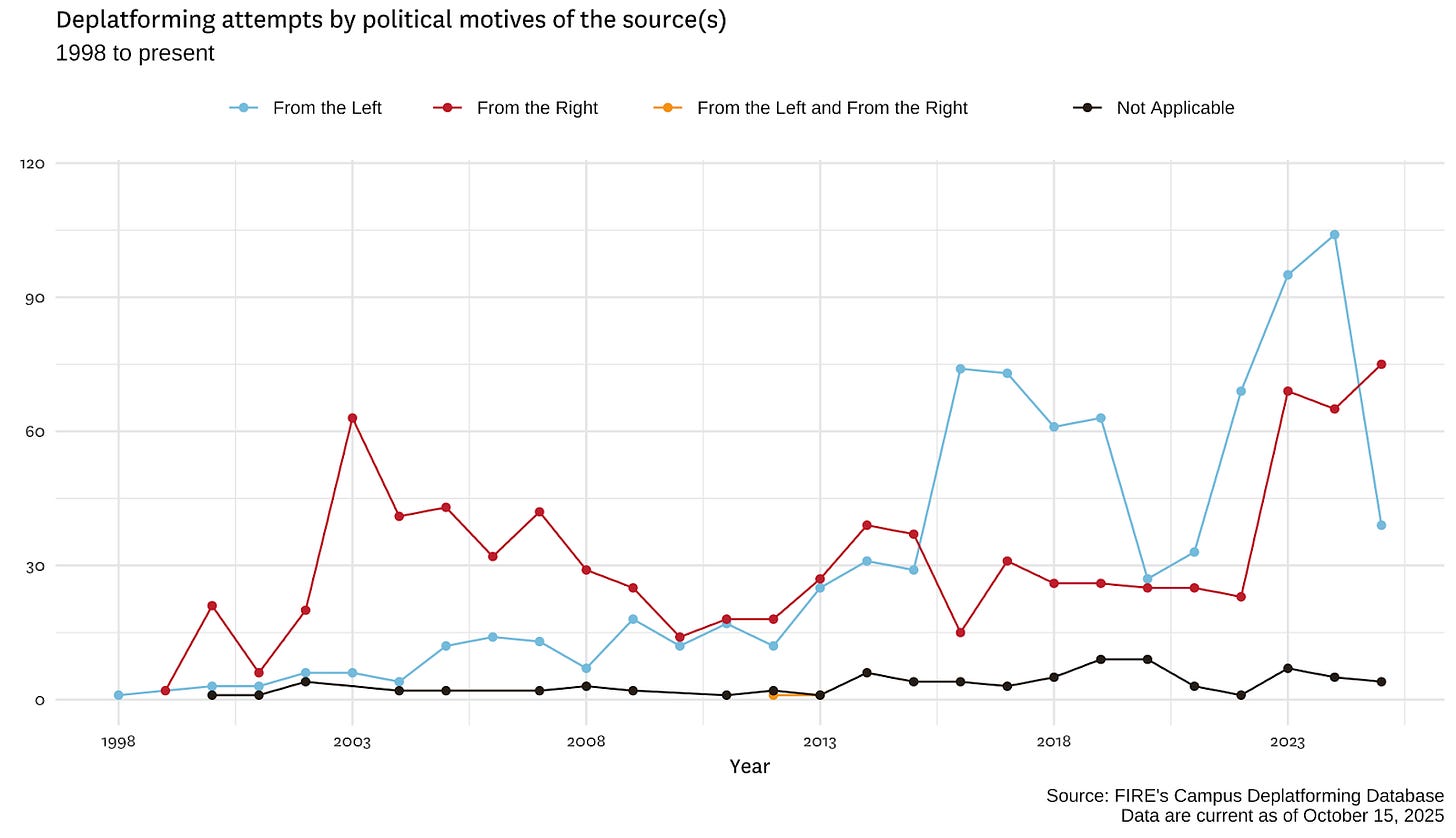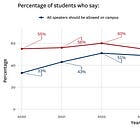Recent developments mark a significant shift in the forces that threaten free speech on campus. The number of deplatforming attempts — efforts to prevent invited speakers from appearing on campus — has now exceeded 100 for the third consecutive year. This is an unprecedented streak, signaling that the impulse to silence rather than engage controversial voices has become a persistent feature of campus life.
What’s new in 2025 is not just the volume but the direction of these deplatforming attempts. For the first time since 2015, more deplatforming efforts have come from the right of the expression rather than from the left — and the difference isn’t even close: The number from the right (75) is almost double the number from the left (39).
In 2025, conservative actors are increasingly organizing and pressuring institutions to cancel events, disinvite speakers, or punish expression they find objectionable — particularly in response to speech seen as critical of Israel, supportive of DEI efforts, or perceived as celebrating or justifying Charlie Kirk’s assassination.
Students and student organizations have also faced heightened scrutiny. So far this year, there have been roughly 200 documented attempts to sanction students or student groups for speech-related activities. These efforts range from disciplinary actions for protests and social media posts to revoking funding for student organizations based on the content of their events or political positions.
While some of these actions originate within institutions, many are spurred by external pressure, including alumni groups, media campaigns, and political figures. The net effect is a campus climate where students may feel increasingly uncertain about which forms of expression are protected and which ones might provoke severe consequences.
Defending speech — even speech we disagree with — is not a partisan act. It’s a foundational principle of higher education.
Finally, as we’ve previously noted, attempts to sanction scholars have reached record highs, underscoring growing tension between higher education and political forces. What’s particularly striking is that many of these efforts are being spearheaded by government actors, both at the state and federal levels. Legislators and public officials are increasingly targeting faculty members for speech they deem controversial or politically charged, often under the guise of combating bias.
These interventions are not isolated. They reflect a broader trend of state involvement in academic discourse, raising serious concerns about the erosion of institutional autonomy and the potential chilling effect on scholarly research and classroom dialogue.
To be clear, not all challenges to speech are unjustified. Universities must balance open dialogue with community standards, safety concerns, and legal obligations. But the scale and source of recent efforts to control speech, particularly those led by government officials, raise urgent questions about the future of academic freedom and the role of universities as spaces for open inquiry.
As campuses navigate these pressures, the need for principled leadership has never been greater. Defending speech — even speech we disagree with — is not a partisan act. It’s a foundational principle of higher education. In a year defined by escalating attempts to silence students, faculty, and outside voices, recommitting to that principle is essential.






The basis for this claim is bogus, blatantly dishonest statistics that government censorship from the right is “spiking”.
This claim and graph continues the dishonesty from the “the vibe in campus censorship” piece. From which comes this admission of how the dishonesty has been done:
“FIRE defends individual rights, therefore we count each scholar as an individual entry, resulting in 111 of the 151 entries recorded in 2025 so far — and we’ve only reviewed about a third of the titles on the list for removal.”
Such a cheap, dishonest way to claim that censorship from the right and from the government is up relative to the left.
Almost all past FIRE reporting has been about incidents of censorship.
But now the claim is that the removal of a particular book from a library is a separate attack on a specific *scholar*?!?!? 🙄
Please.
Are you *really* claiming that you have reviewed the entirety of all past FIRE reporting and verified you held it to the same standard of “individual” rights in your counts?
I would be extremely surprised to find that that is the case.
By that logic, does that mean you counted the individual students who planned to attend and were denied their right to access to a given speaker when a speaker was not allowed to speak?
Of course you did not make such an impossible count.
Of course If you did, the claims of “balance” in censorship attacks on students up through 2024 would be preposterous.
Do you truly not see the double-standard in counting and presenting the censorship incidents from each side?!?
So by this logic, had there been 300 members of the GMU faculty Senate that would have been 300 incidents of attacks from the right instead of 55 (or the *correct* view, which is ONE incident of a particularly disturbing attack)? 🙄
For the rest of us who don’t want to have to spend the time to review each and every prior FIRE incident case, can you show us your work, or tell us when the “policy” about each book counting as an individual instance of censorship was made FIRE’s practice? Does this go back to early in the organization’s founding? Because it sure smells like a way to put the thumb on the scale…
And/or you are not reporting that in fact you count attacks against students’ rights to be free from censorship by having speech denied to them differently from “scholars”.
Lies, damn lies and statistics I guess.
This counting of books removed as “incidents”, and of multiple faculty in a faculty senate each as separate “incidents”, is an indefensible double standard clearly done by motivated staff trying to show that the censorship on campus from the right and by the government right has been close to equal that from the left.
How about some examples??